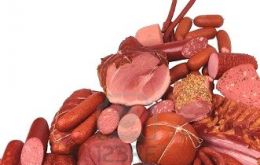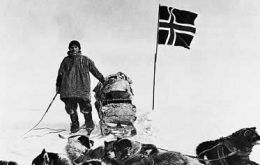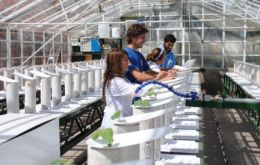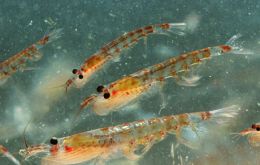MercoPress. South Atlantic News Agency
Health & Science
-
Tuesday, March 1st 2011 - 00:09 UTC
UK government recommends cutting back on processed meat to reduce cancer risk

Consumers should cut back on red and processed meat to reduce their risk of getting cancer, according to the British government. New advice recommends eating no more than 70g a day - equivalent to three rashers of bacon or two sausages.
-
Monday, February 28th 2011 - 00:22 UTC
NZ abandons search for Norwegian yacht with three men missing in Antarctic waters

A week-long search for a Norwegian yacht missing in Antarctic waters with three men aboard has been abandoned, New Zealand's Rescue Co-ordination Centre announced Monday.
-
Monday, February 28th 2011 - 00:09 UTC
Mercosur researchers create robot to identify drought and disease resistant soybeans

A robot which categorizes soy bean plants according to their capacity to resist drought and make better use of the water resource has been developed by a bio-technology group of Mercosur researchers in Argentina, with European Union support.
-
Thursday, February 24th 2011 - 06:45 UTC
Magnetic observatory in South Georgia to track the “South Atlantic Anomaly”

A magnetic observatory is being re-established on South Georgia to provide vital data on the 'South Atlantic Anomaly' as scientists monitor a possible reversal of the earth's magnetic field. This field, generated deep within the planet, shields against particle radiation from space.
-
Thursday, February 24th 2011 - 06:28 UTC
Marijuana ingredient helps chemotherapy patients recover taste and appetite

New studies explain that patients who have experienced chemotherapy and have difficulties eating may not notice those difficulties much longer. The active ingredient in marijuana, THC or tetrahydrocannabinol, has been shown to drastically increase appetite levels and help individuals enjoy the idea of eating once again.
-
Thursday, February 24th 2011 - 03:37 UTC
Using a mobile phone stirs brain metabolism, says US medical report

Using a mobile phone for 50 minutes stirs brain metabolism, although the health consequences are unknown and need to be studied further, U.S. researchers said.
-
Wednesday, February 23rd 2011 - 22:24 UTC
An alcoholic drink a day helps keep heart disease at bay, says medical report

An alcoholic drink a day can help keep heart disease at bay, according to a review of 30 years of research. The work, published in the British Medical Journal, showed a 14% to 25% reduction in heart disease in moderate drinkers compared with people who had never drunk alcohol.
-
Monday, February 21st 2011 - 17:16 UTC
Krill sex caught on camera in 700 metres deep Antarctic waters

In a world first, the sex life of Antarctic Krill in the wild has been caught on camera revealing the shrimp-like creatures are able to mate deeper in the ocean than previously thought.
-
Friday, February 18th 2011 - 05:23 UTC
European MPs warn about “a flood of meat imports” from Mercosur

Members from the European Parliament representing rural constituencies have come out strongly against a possible trade deal between Europe and Mercosur arguing that an influx of meat imports could have a devastating impact on the EU beef industry.
-
Wednesday, February 16th 2011 - 19:12 UTC
The mobile phone is the new PC anticipates Google CEO Schmidt

The mobile phone is the new PC, Google Chief Executive Eric Schmidt said this week at the Mobile World Congress in Barcelona, Spain.